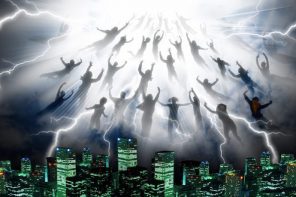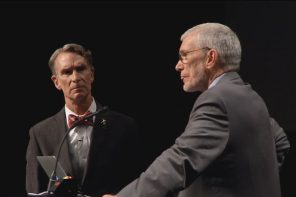End time belief has an almost salacious appeal in America—and not just to the four out of ten Americans who believe that Jesus Christ will return to Earth by 2050. At least since the Millerites were laughed off the national stage in 1844, watching prophecy fail has become something of a national pastime. The attitudes of the two groups—heavenly-minded believer and smirking spectator—are well captured in a pair of bumper stickers: “In case of Rapture, this car will be unmanned” and “In case of Rapture, can I have your car?”
But some in the spectator camp hold that America’s remarkably durable “rapture culture” is no laughing matter; that it might, in fact, be a menace to society. At issue is end time believers’ perceived lack of investment in the earth’s future. That is, if they believe Jesus is coming back, do they have any incentive to preserve and protect the environment for future generations?
Many who are concerned about the environment—including prominent figures like Al Gore, E.O. Wilson, and Bill Moyers—argue that for such believers the answer is no.
Although mistrust of end time believers’ earthly intentions has smoldered for decades, a new study about “End Times Theology” has added fuel to the fire. According to the study’s authors, political scientists David Barker and David Bearce, when it comes to climate change, “a belief in the Second Coming reduces the probability of strongly agreeing that the government should take action by more than 12 percent.”
The reason, according to Barker and Bearce, is that while
“non-end-times believers have little reason to doubt humankind’s infinite persistence, all else being equal, end-times believers ‘know’ that life on Earth has a preordained expiration date, no matter what—and that all Christians will be raptured before the going gets too tough.”
With 76% of Republicans identifying as end times believers in their sample, they argue that end time belief may be a key factor stymieing climate change legislation.
But as someone who spent 14 months doing interviews and focus groups with conservative Christians on their views about climate change and the end times, I see major problems with their approach.
The study’s main flaw is that it measures attitudes toward climate change using a double-barreled question—one that’s actually comprised of more than a single question. Barker and Bearce asked respondents to state the degree to which they agreed with the following:
Global warming is a problem that requires immediate government action, in order to prevent environmental devastation and catastrophic loss of life for future generations.
The statement actually contains four parts, each of which could elicit a different level of agreement: global warming is a problem; the government should be the institution to address it; action needs to be immediate; and the reasons for acting are to prevent environmental devastation and catastrophic loss of life.
The authors did acknowledge one shortcoming of the statement; namely, that it does not allow them to distinguish between those who are skeptical that global warming is happening, and those who believe it’s happening but do not feel anything should be done about it. Since the latter claim is the one these researchers sought to prove, they controlled for “media distrust,” which they argued would be correlated with climate skepticism.
There are, however, at least two other reasons some conservative Christians would disagree with the statement besides their belief in End Times. First, having seen the government “take” prayer out of schools, and “force” the teaching of evolution, the Christians with whom I spoke had an especially negative view of government in general.
As Kelly (a pseudonym, as are all the names that follow) explained in a conversation about the merits of scientific research on climate change,
“I believe the government knows that whoever controls the mind of our children controls the next generation. And so there’s reason behind everything that’s put out there… I think they try to cause us to fear. And when you fear you want to have someone to trust in.”
After which her husband chimed in, “And that would be the government.”
As Linda (from another church) put it more succinctly, “Government needs to stay out of it. They screw everything up.”
Second, and probably even more importantly, participants in every one of the nine focus groups I conducted had the impression that scientists were saying climate change would precipitate an apocalyptic end to the world, an idea they rejected on the grounds that the Bible—not scientists—foretells how the world will end.
Of course, most scientists are not claiming that climate change will end life on Earth, but the study’s use of the word “catastrophic” would likely bring to mind the apocalyptic framing that many if not most of the respondents reject (Wylie Carr and colleagues also noted resistance to the apocalyptic framing in their qualitative study of conservative Christians’ views of climate change).
To be sure, conservative Christians are hardly alone in reacting negatively to apocalyptic framings of climate change. Matthew Feinberg and Robb Willer found that dire messages reduced belief in global warming and made people less likely to say they would take action to address the problem. Based on what I heard in the focus groups, however, I surmise that conservative Christians are more bothered by apocalyptic rhetoric than the average citizen. When I consider the comments many of them made about how the Christian worldview was being marginalized, it is apparent that these Christians might see a secular disaster narrative as yet another attempt by secular society to “take God out of the equation” (a refrain I heard frequently).
Thus some Christians may have disagreed with Barker and Bearce’s statement because of the word “catastrophic” in this context, rather than because their belief in the end times rendered them indifferent to such a prospect.
In my own research I did find some evidence of apathy about climate change that seemed to be related to end time belief. This only seemed to be the case among those who were truly passionate about the end times, however. In a small-town Pentecostal church I visited, for example, during a Sunday service the pastor painted a vivid picture of a world descending into chaos, listing a coming “holy war” with Iran, Christians being persecuted around the world, the inability to pray in school (“These days you get in trouble if you say ‘bless you’ when someone sneezes at school!”), and the way society increasingly “exalted the homosexual lifestyle” as signs that the end times were near.
“The Bible says this will happen in the Last Days, before the Rapture. We should expect suffering if the Lord tarries. Jesus Christ is coming back!” he concluded exultantly.
Not surprisingly, when I conducted a focus group at this church, the end times seemed to be on everyone’s minds. When we talked about caring for the environment, for example, Craig cautioned that it was important to draw the line between protecting the creation and worshipping it, while Julie agreed, adding that, “like with the polar bears and stuff, of course I don’t want them to die, but you also have to realize this is just a part of the world coming to an end like it’s supposed to. And there’s nothing really that they can do.”
After Sarah chimed in “Yeah, we can’t stop it,” Julie continued, arguing, “That’s why we need to be educated in the Bible, so we know what signs to look for. Because you’re just wasting all that money on research when it’s, sadly, not going to help.”
Such views contrasted with those I heard from people who believed that Jesus would return to Earth but did not actually think they were living in the last days. There, I almost invariably heard statements expressing ethical responsibilities vis-à-vis the environment. For example, Jessa pointed out that
“we constantly talk about the end times and as Christians we look forward to that but the Bible didn’t tell us to be stupid. When the Bible says if you have faith as the grain of a mustard seed you can move mountains, it didn’t literally mean for us to go and start trying to pick up a mountain… [W]henever He tells us that we’re going to see these signs of the end times, He doesn’t tell us to stop living because the world’s coming to an end. He wants us to live for Him every day, and living for Him means taking care of the world, and seeing that the environment is changing, and that we have an effect on that.”
In many cases such comments may have reflected ideals more than practices, as I did not see much evidence of dedication to environmental stewardship beyond recycling. But the majority of my respondents rejected the logic that end time belief justified inaction of any kind, pointing out that they still held bank accounts, sent their kids to college, and otherwise planned for the future.
This belies Barker and Bearce’s claim that any Christian who agreed to the question “do you believe in the Second Coming of Jesus Christ—that is, that Jesus will return to Earth someday?” would have been likely to discount the future. From what I saw in the field, people who did not live in the shadow of the Last Days recognized the folly of giving up on this world when it was uncertain when the next one would come.
This highlights another problem with Barker and Bearce’s study: it only included two belief-related variables: the one about the second coming of Christ, and another that assessed whether respondents believed the Bible “should be taken literally, word for word.” Consequently, the study did not assess how much of the indifference to taking action on climate change might derive from a host of other beliefs.
Perhaps most important to consider is whether suspicion of scientists and scientific research may be spilling over from the creation-evolution debate (as Katharine Wilkinson found in her qualitative study of the evangelical ‘climate care’ movement). But other beliefs could easily be relevant as well. Many scholars of evangelical environmentalism, for example, have noted evangelicals’ concerns that caring for the environment could lead to paganism.
I also frequently heard Christians say that their focus should be salvation and saving souls rather than pursuing a broader social agenda. Others argued that it was arrogant to believe humans could control the climate, since “God is in control.” It seems likely that Christians’ attitudes toward climate change would be influenced by beliefs such as these, yet none of them were included in Barker and Bearce’s study.
In short, my own research and that of others leads me to surmise that had Barker and Bearce adopted a more fine-grained approach, they would likely have found that end time beliefs contributed only modestly to Americans’ disinterest in addressing climate change.
Tempting as it may be to blame end time believers for the frustrating lack of action on climate change, if we want to determine whether and to what extent the religious beliefs of Christians shape their views and concerns about the issue, and understand the impact of such perceptions on daily and political life, then we will need more nuanced empirical research into these issues than has, as yet, been produced.




